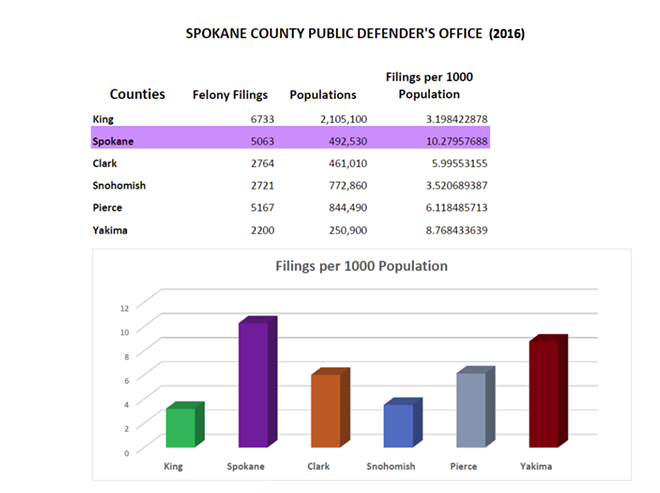Monday, October 30, 2017
Spokane County's felony rate is highest in the state, public defender says
Prosecutors in Spokane County have filed felony charges at a higher rate than any other county in the state, according to statistics provided by the Spokane County Public Defender's Office.
But does that mean Spokane is any less safe than those other counties?
No, Spokane County Public Defender Tom Krzyminski would argue. Why, then, is Spokane ostensibly the most felonious county in the state?
"It's discretion," Krzyminski told county commissioners earlier this month, indicating that prosecutors are choosing to file felony charges in situations where a lesser charge might be more appropriate.
He cites as an example a shoplifting incident "that's really a misdemeanor level, but something happens on the way out, and there's a push. They're grabbed from behind and push back against the clerk. Here, it's charged as a robbery. Does it have to be charged that way?"
Or, he says as another example, what he would consider misdemeanor-level trespassing that's charged
"So I'd be asking those questions if I was looking at other jurisdictions," Krzyminski says. "Do you feel less safe in those other counties than in Spokane?"
In 2016, Spokane prosecutors filed 5,063 felony cases, compared to King County's 6,733, Pierce County's 5,167, Snohomish County's 2,721 and Yakima County's 2,200, the numbers show.
Adjusted for population, Spokane prosecutors filed about 10.3 felony charges per 1,000 people — more than double that of King and Snohomish counties, at 3.2 and 4 per 1,000 people respectively.
Spokane County Prosecutor Larry Haskell questions whether the numbers provided by the public defender are accurate. He provided a map that shows Spokane with a lower felony filing rate than some counties, such as Okanogan and Lincoln, but still more than King,
But more important, Haskell argues, the number of felony filings alone does not show the entire picture. He says it's important to consider the total arrests by police, the number of times his office declines to file any charges
"We charge consistent with the facts and the statute," Haskell writes via email. "Our charges must also pass muster with the judges. We use great discretion with these types of cases and charge on a case-by-case basis.
Krzyminski presented these numbers and made his case to the county's Board of Commissioners earlier this month. As Spokane County faces a $10 million budget shortfall, each department was asked to come up with cuts and present their ideas to county commissioners.
Spokane County Sheriff Ozzie Knezovich has said the impending cuts could mean 12
Krzyminski, citing the high rate of felony filings, proposes no cuts.
"The public defender's office does not control the number of cases that
The state Supreme Court has set a limit on the number of cases public defenders can handle in a given year. Any cuts to their budget would mean laying off attorneys and turning cases away, Krzyminski says.
That means the public defender's office would be forced to send more cases to private defense attorneys who contract with the county. On average, the county pays about $1,316.33 for a private attorney to handle the case, compared to about $700 if the case stays in-house, Kryzminski says.
Tags: Spokane County , felony , Spokane County Public Defender , Spokane County Prosecutor , Tom Krzyminski , Larry Haskell , County Board of Commissioners , Ozzie Knezovich , budget , criminal justice , News , Image


















